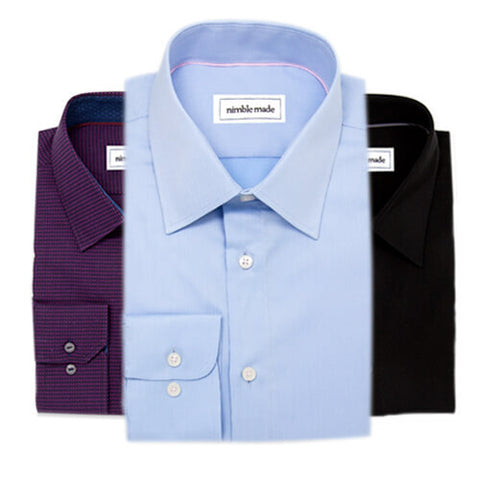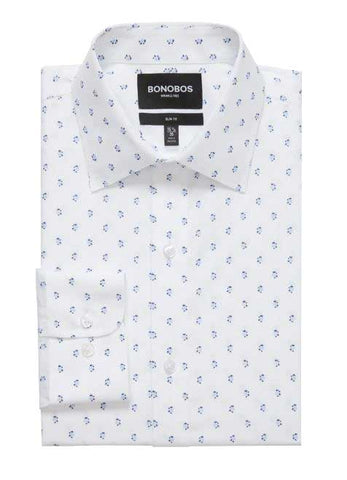
You want to make a good impression any time you walk into the room and that means looking sharp while adhering to typical accounting dress code. This is especially true when you’re at an accounting firm, working with other professionals and clients.
The professional world requires a certain dress code that's more than just "business professional attire or business casual", but it’s not always easy to figure out that code when you’ve just graduated college and are ready to start your new job.
You've dressed for graduation and now are ready for the big leagues. Rather than overdress or underdress for an awkward first day, take a look here to get started on the right foot - with the proper dress shoes, dress pants, and dress shirt of course.
Best Dress Shirts for Accountants
| # | Brand | Rating | Comments |
|---|---|---|---|
| 1 |
[Overall Favorite] Nimble Made |
★★★★★ 4.7 / 5 |
|
| 2 |
|
★★★★☆ 4.2 / 5 |
|
| 3 |
|
★★★★☆ 4.1 / 5 |
|
How to dress as an accountant
There’s a reason why the phrase is “dress for success.” To dress for success as an accountant, whether you’re a man or a woman, you’ll have to trade in your hoodies and business casual jeans for something a little more professional than just meeting a casual dress code. Let’s start by going through some of your dress code options.

Business Formal
This is what you would normally think of when you think of working in accounting. For men, business formal means a full suit, including the nice tie, the cufflinks, the pocket squares, and the nice dress shirt. For professional events, this dress code is typically what to wear to a conference or similar networking event.

For women, you can never go wrong with a pantsuit or collared dress.
This is the type of dress code you should usually follow if your firm requires it, or if you don’t know the proper dress code yet. While you don’t want to overdress, it’s much better to overdress than to underdress. It's probably not necessary to dress up as business formal often - after all, accountants don't typically have to dress up like lawyers, who are typically client-facing.

Business Professional
This is one step down from business formal and common among finance bros, so it’s quite similar, but you can lose the full suit if you’re a man, and you can choose a nice skirt and blouse if you’re a woman. You’ll only want to dress down, however, if you know that it’s okay to do so. Keep it safe and if it's your first day ai for business professional in most situations in the US.

Business Casual
Finally, we have business casual, which means no suit, but you do need to dress yourself nicely. You can choose a business casual shirt, polo shirt and khakis if you’re a man, and can choose a collared shirt and sweater if you’re a woman.
Of course, business casual or any business attire for that matter varies quite a bit depending on where you are located - the West Coast for example is a lot more casual than the East. We also have a whole detailed guide on business professional vs business casual.

If your firm allows you to go completely casual, be careful with what you choose to wear. Double check with someone in the firm to be sure that you’re on the same page with what “casual” means. Don’t just show up in your jeans and tee shirt; check on what’s acceptable before you come in.
On your first day
This is the most nerve-wracking day, since you haven’t had the chance to figure out how most people at the firm dress yet. Even if you’re told to dress a little more casual though, you should think about dressing just a tad more formal just for your first day. This way, you can avoid dressing a little too casually without meaning to so play it safe and skip out on the casual attire.
Be a Chameleon
In some ways, you have to blend in a little when you step in your office. Observe others and adjust your clothing to match. You don’t want to make it seem like you’re trying to out-dress your co-workers to make them look bad, nor do you want to show up looking lazy like you didn’t try to look nice.
The only exception may be smart casual days where most people dress down, but you notice some managers in suits. In this case, you might want to dress in some kind of style that’s in-between so that you still look formal, but that you don’t stand out too badly either.

Depending on your firm
So, which of these dress types should you go for? Well, know that the specific dress code is dependent upon your firm. There are certain firms that are okay with khakis and sweaters, for instance, while others want slacks and dress shirts that feel much more formal. You may end up at a firm that is much more casual once you actually begin working there, but if you’re not sure about the dress code right away, it’s always better to be formal. If you'd like to go more smart casual, try a sweater over your dress shirt.
Dress appropriately for your job interview, and remember to tailor your clothing to the firm you’re interviewing for, or order a bespoke suit. If you’re interviewing at a more casual tech startup, you might not need to choose a full suit or tie at an interview. Once you have a job, you can study how others in your firm dress each day to help you understand what works for you.
Your own judgement
Some firms don’t necessarily have set dress codes, but tell you that what you wear is up to you. Really, this just means to use some common sense, and to observe the other employees to see what they’re wearing. Take a few days to see what other people are wearing and ask around if you aren’t sure.
It’s always best to stay formal if you aren’t sure though, or to think about what you’ll be doing that day. If you’re meeting with a client, you might want to present yourself as more formal, but if you’re only in the office that day, it may not be too necessary to go full suit and tie. There really isn’t a dress code that applies to every situation and every firm, but it’s important to present a good image of yourself and your firm.
Get the Best Dress Shirt Here
Confidence
No matter how you dress, make sure that you dress confidently. You have to own your clothing and how you present yourself, so if you don’t feel comfortable in a skirt or you can’t get used to those shoes, switch them out for something else (if your workplace allows it, look for some business casual sneakers). You’ll be able to present yourself much better if you feel good about what you’ve got on.
So, if you want to wear makeup every day, go for it. Or if you only want to wear heels when you meet with clients, that’s a good option too. It just depends on what you feel comfortable doing when you present yourself as a member of your firm.
For Women
Women often struggle with their clothing choices being perceived negatively. Their blouse is too loose, or a skirt is too short, or a dress isn’t conservative enough. It can be harder to dress as a woman since you have more choices generally about your clothing.
It’s helpful to begin with formal clothing then, like a skirt or pant suit. Wear very straightforward button-up shirts when you first begin so that people know that you’re serious about your career. This will also give you some time to see how other accountants are dressing, and adjust your clothing to match.
To be the most prepared, dress as professionally as you can. Even if there’s a business-casual day, think about remaining formal. This helps when you don’t necessarily know what to wear as well—since the idea of what a blouse is can vary from person to person.

Heels or dresses
It used to be that women were required to wear heels to work in accounting and in other formal environments, but times have changed. For the most part, women can wear whatever footwear they would like, although it does still need to be formal depending on the requirements of your workplace. For instance, you might not be able to wear sneakers, but a nice pair of flats shouldn’t be a problem.
In terms of dresses too, many women prefer to wear conservative dresses in a business environment, but what you wear is up to you as long as you’re still dressing respectively and professionally. You are not obligated to wear a dress if you don’t want to, but any pantsuit or slacks should still be paired appropriately to match the environment.
Don’t forget your individuality
You may need to dress completely formal every day, but that doesn’t mean that you have to sacrifice your own personal sense of style. There are little details that can spruce up your style, from your socks to your jewelry.
Wear socks with a little design on them, and use this part of your outfit to add a little color. There are all types of socks out there, just like there are all types of ties. You can find a tie that will match your sense of style while still looking great and matching a more formal dress code. You can even customize your dress shoes by choosing the color and style to pair with your specific suit or dress, and dress shirts in different colors are a must have.
Don’t be too adventurous though, and make sure that you’re still as formal as you need to be. Test different styles with your skin complexion, height, weight, and style to see what works for you and what will work for your required dress code. Just because you need to look nice on a daily basis doesn’t mean that you will have to look the same as everyone else.

Mix and Match
You don’t need tons of clothing or accessories to show off your style. All it takes are a few little details to make your professional attire your own. You might only have a few ties or only dark-colored skirts, but it’s all about how you mix or match your clothing.
Take your tie and pair it with another colored shirt, or pair it with an entirely different outfit. The fabric of the tie matters too. Even the smallest details can add a little flare to your workplace professional style.
Don’t be too distracting
Individuality is a great thing, and you shouldn’t shy away from your own style, but don’t choose something that distracts from the ability of others to get to know you. You want people to focus on your talents and your intelligence, not stare at the shirt you’ve got on. Since people are predisposed to pay attention to physical appearance, you’ll want to dress to be like you, but no clothing choice should take away from another person’s ability to focus on you and your professional abilities.
Stay professional in your wardrobe then. While that trendy tie or that nice shirt might be a good talking point for a few minutes, it doesn’t help you maintain your professionalism in the long term.
Dressing Tips
You want to look nice not only when you first show up to the office, but all throughout the day. As you probably know though, it can be irritating to continually readjust your shirt or smooth out your skirt. But dressing professionally doesn’t have to be irritating when you can grab a few extra accessories to help you out.
For instance, if you’re a man and would like to keep your shirt tucked in at all times, you can pick up a shirt stay. Your shirt will not become untucked throughout the day. You can pick up something to keep your socks up too so that when you’re with your clients, you don’t need to struggle with looking your best at all times.
General Guidelines
Our #1 Recommended Dress Shirt
You already know that there’s no overall dress code that will apply to every firm. This is because every firm is different, but there are some general guidelines that will help you look good no matter where you are.
First off, make sure that your clothing fits properly. As a man, your suit should not be too big or too small, so get some alterations if you need to. It can be a little harder to know for women if a blouse is too loose or not, for instance, but regardless, check that your clothing is the proper size for you and is in good condition.
Wear neutral colors too. You can put your individuality in your outfit in other ways, like in your tie, but you don’t want to show up with an off-colored blazer or something like checkered pants. All colors should be complementary, match with each other, and show your firm how professional you are at the same time.
Conclusion
It can be difficult to figure out to dress in the professional environment that comes with accounting. You want to look nice, but there are so many options when it comes to dressing professionally. Consider these tips to dressing well as an accountant and to doing great on your first day and every day after that too.
FAQs
1. Do accountants have a dress code?
While it is best to avoid overdressing, it is better to overdress than to underdress. As an accountant, you won't need to dress in business formal attire frequently - after all, accountants don't have to dress like attorneys, who are typically client-facing.
2. What is the dress code for an accountant?
Polo shirts, collared shirts or sweaters, khakis, dress pants, and dress shoes are appropriate for men. A tie is not required. Dresses, skirts, collared shirts, sweaters, dress pants, and dress shoes or boots are appropriate for ladies.
3. What is business professional attire?
When you dress in business professional clothes, you typically wear conservative clothing to present yourself professionally. Men should wear a blazer or suit jacket, a button-down shirt, suit pants, a tie, and dress shoes, while women should wear a skirt or pants suit with heels.
4. Do accountants wear uniform?
To reflect the image of the profession, accountants dress conservatively. Darker colors are considered authoritative, which is why accountants wear black and blue suits.
5. How many suits should an accountant have?
With this in mind, we propose that every guy own a minimum of three suits: one navy, one charcoal, and one black.







Comments (0)
Back to News